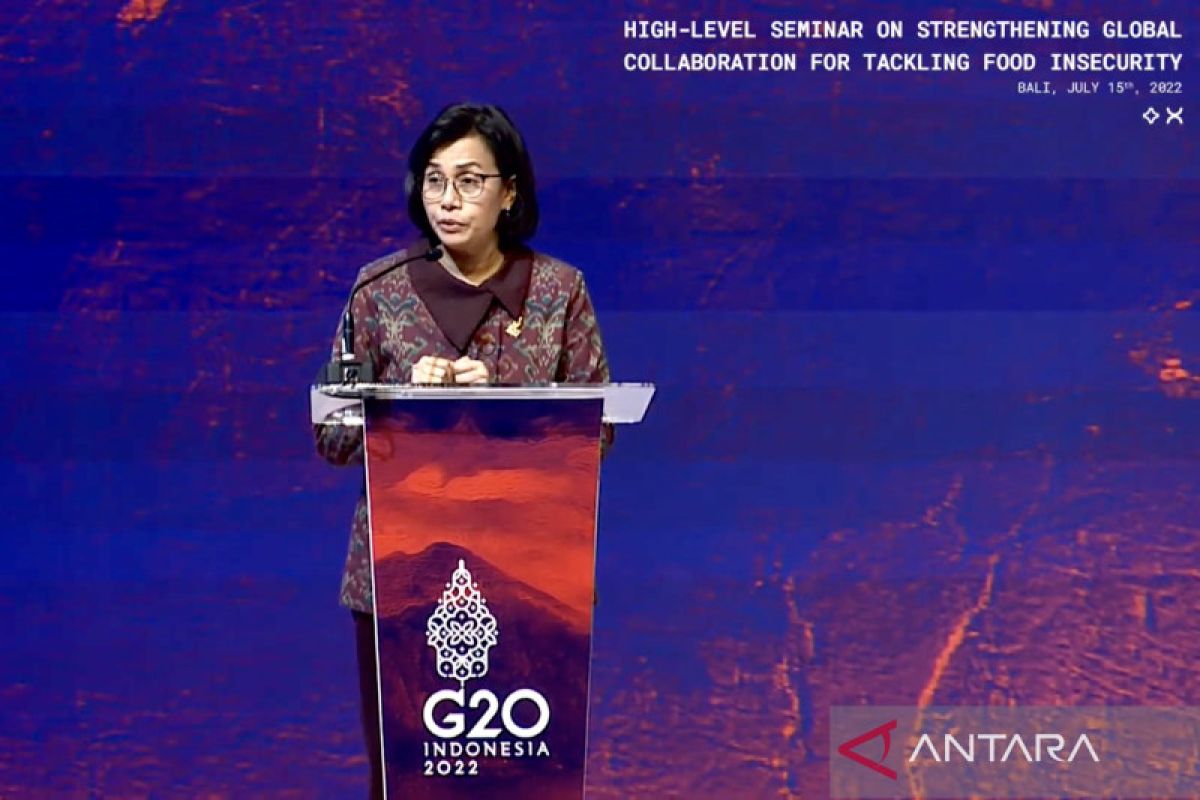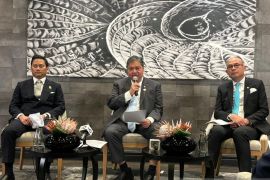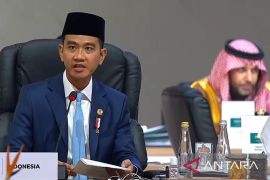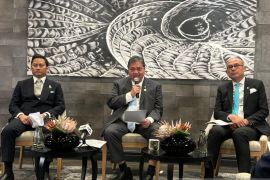The problem of starvation drew the world's attention, primarily G20, since at least a decade ago when South Korea assumed the G20 presidency in 2010.
France, when it led the G20 one year after, once again drew attention to the issue. However, the issue never moved on from the discussion stage despite the meetings.
Concrete actions to handle food insecurity are almost impossible to find despite the fact that the issue of starvation became more apparent after the Russian military blockade in the Black Sea, hindering global food distribution.
However, this dead end finally found a bright spot after the G20 Finance Ministers and Central Bank Governors (FMCBG) meeting was held in Bali on July 15-16, 2022.
At the meeting, Indonesia drew the interest of the world, specifically G20 countries, toward the issue of food insecurity.
During the third G20 FMCBG meeting, the issue of food insecurity was included in the discussion on the global economy situation and risk.
Related news: Central banks face complex challenges globally: BI Governor
Food insecurity was deemed as a global finance risk that can emerge as a result of the pandemic, war, and climate change.
Indonesia, along with Saudi Arabia and G20 members, continue to rally support from other parties, such as the UN and World Bank, to realize concrete actions that can prevent or at least anticipate food insecurity.
This is important, given that the situation is experienced by several underdeveloped and conflict-ridden countries.
During the High-Level Seminar on Strengthening Global Collaboration for Tackling Food Insecurity, which was the FMCBG side event, Indonesian Finance Minister Sri Mulyani Indrawati suggested to G20 members to bring together finance and agriculture ministers.
They should be brought together to discuss strategies to confront food insecurity and other related issues.
The world needs to form global cooperation to mitigate the problem of food insecurity that can be initiated by G20 countries, she noted.
The established global cooperation should be able to ensure affordable food for everyone and support an open, transparent, and non-discriminative trade system, she remarked.
Moreover, it should support the multilateral principle that aligns with the WTO regulations and bolster the transparency of the world's food supply chain, she noted.
According to the minister, it is important to promptly realize the meeting between finance and agriculture ministers, considering the fact that food insecurity is an urgent issue that should be discussed together.
Related news: RI strives to bridge differences in G20 to address economic challenges
She is optimistic that G20 member countries would be able to realize this based on the finance and health ministers' meeting to discuss the COVID-19 pandemic mitigation measures.
As a result of the meeting and other efforts, ministers agreed to form the Financial Intermediary Fund (FIF) that can be utilized by countries to bolster preparedness against pandemic threats in future.
G20 should be at the forefront to create concrete steps to handle the problem of food insecurity comprehensively and effectively, Indrawati stressed.
G20 members' response
Her proposal was welcomed by finance ministers of several G20 members, such as Italy and Brazil.
During the seminar, an official representing the Brazilian Finance Ministry, Marco Aurelio, noted that his country welcomed the suggestion from Indonesia and Saudi Arabia.
The meeting between finance and agriculture experts is expected to be able to produce data-based solutions.
The issue of food insecurity should be resolved through pragmatic and structural approaches, he remarked.
Pragmatic resolution is achieved by resolving problems related to the COVID-19 pandemic, war, and inflation, while the structural approach is conducted by resolving problems in the production and distribution sector.
The entire distribution route for food should always be open, and there has to be a study that maps out countries vulnerable to food insecurity, he emphasized.
Countries have to stop maintaining inefficient food production and distribution structures, especially if there are other more efficient methods, Aurelio stressed.
This is because there is a pressing need to produce agriculture lands in inefficient locations that can only survive through the government's subsidy.
Related news: Financial intermediary fund commitment reaches US$1.28 billion
On the other hand, Brazil managed to produce more food sources in less land than other countries, which makes the rest of the land available to be converted into conservation areas, he remarked.
Brazil is an agriculture powerhouse that can provide food for 800 million people across the world, or around 10 percent of the world's population, he noted.
Based on this, Brazil is ready to contribute to seek solutions to resolve food insecurity issues, he remarked.
Meanwhile, Italian Finance Minister Daniele Franco expressed support to Indrawati's suggestion and awaits the realization of the meeting between finance and agriculture ministers.
He believes that this meeting can be realized since countries across the world managed to bring together finance and health ministers last year.
Finance ministers cannot work alone, given that the threat of food insecurity became more real and can become worse in the future, he remarked.
For the short- and medium-term, G20 countries should allocate aid fund to global organizations and institutions that distribute food for underdeveloped countries, he emphasized.
The current priority should be ensuring money availability to meet the WFP's demand, he opined.
Related news: G20 members agree on majority of FMCBG results: Indrawati
Global partnership
The support from global financial institutions, such as the International Monetary Fund (IMF) and the World Bank, is also needed to handle food insecurity in addition to the G20 members' support.
IMF Managing Director Kristalina Georgieva noted that the institution is ready to play its role, such as by providing funding, assisting in debt problems, and allocating emergency fund.
IMF is ready to make all-out efforts to help in handling the problem of food insecurity.
However, countries should also contribute in resolving the problem of starvation and food insecurity, such as by revoking the policy that limits food distribution.
Not only is the policy immoral but it is also dangerous to the world's economy, she explained.
During the event, she also expects that the negotiation with Russia can be successful, so that the blockade in the Black Sea can be over soon.
Once the blockade is over, food sources produced by Ukraine can be distributed to countries that need it.
World Bank's Managing Director of Operations Axel van Trotsenburg agreed with Georgieva's suggestion.
Starvation and food insecurity are problems that have been discussed since long, though coordinated and effective steps had yet to be taken to resolve them.
He highlighted that the World Food Conference held in 1974 aimed to eradicate starvation within 10 years, a target that countries across the world never managed to reach.
Hence, he encouraged G20 members to not only think about short-term strategies but also long-term approaches to address the issue of food insecurity.
Related news: BI Governor urges G20 nations to support global economic recovery
Long-term strategies relate to agriculture, social, and trade sector policies in which World Bank observed that there are several policies that limit food trade, Trotsenburg noted.
Various forms of support and commitment from countries and international organizations conveyed within the G20 FMCBG in Bali shows that there is a strong signal from all parties to immediately act to handle starvation and food insecurity.
However, even more important is the fact that after the seminar, concrete actions should be taken by countries to ensure that policies limiting food trade and actions that hinder food distribution be revoked immediately.
The G20 Summit on November 15-16, 2022 can offer the momentum to produce these concrete steps.
Related news: Younger generation should partake in digital transformation: minister
Related news: W20 Summit participants expected to help promote Lake Toba: official
Editor: Fardah Assegaf
Copyright © ANTARA 2022










